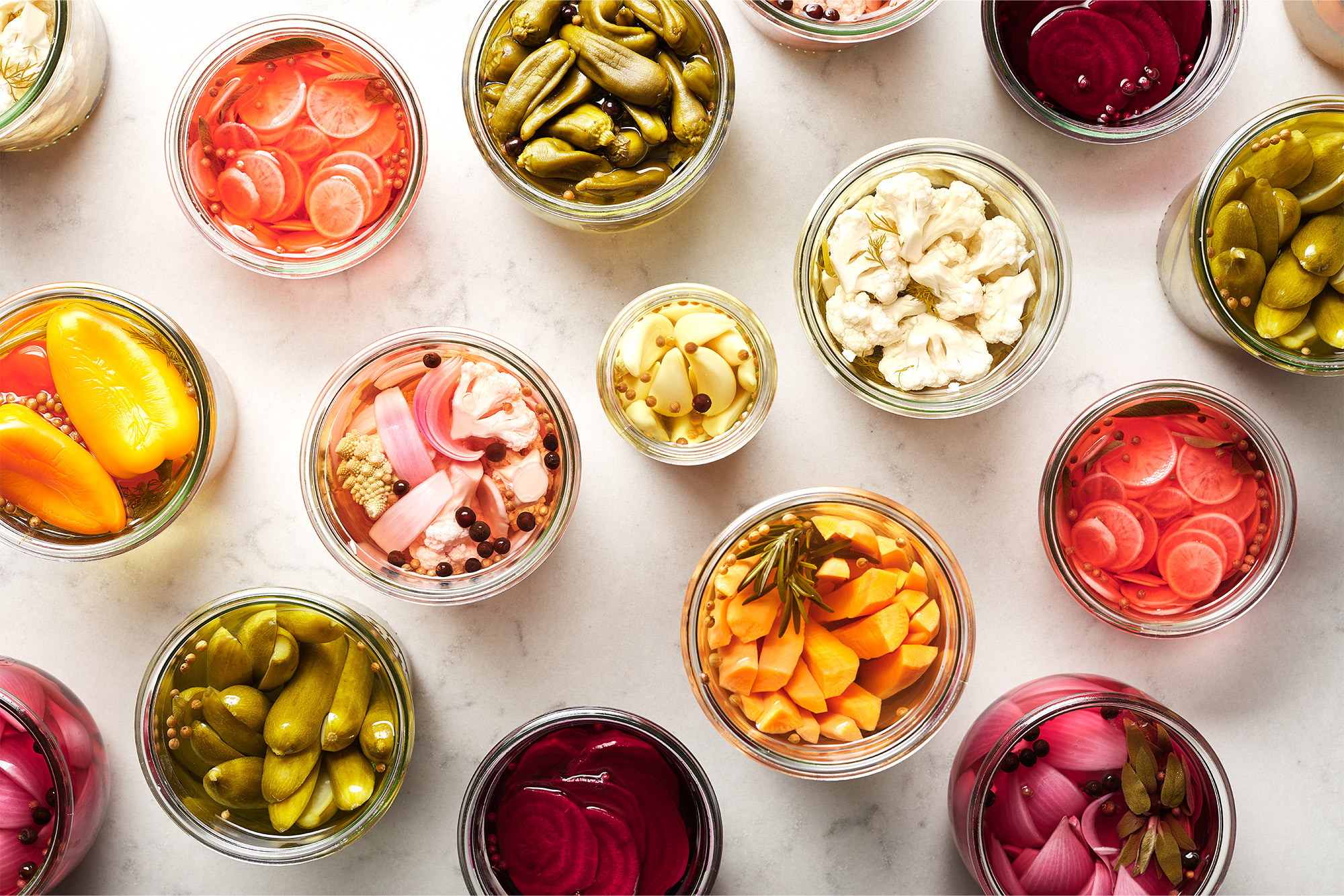Your first encounter with tangy sauerkraut or fizzy kombucha might leave you hesitant, but these fermented foods are worth another try. Beyond their unique flavors, they offer significant health benefits—not just for digestion but for your entire body.
We consulted nutrition and gastroenterology experts to explore the advantages and potential side effects of fermented foods, along with the top 10 options to incorporate into your diet.
Key Takeaways:
- Fermented foods promote gut microbiome balance: Studies suggest they help prevent microbial imbalances linked to digestive disorders, diabetes, and heart disease.
- Many are plant-based: Sauerkraut, tempeh, kimchi, and miso provide fiber and essential nutrients alongside fermentation benefits.
- Moderation is key: Overconsumption may cause bloating or gas, so introduce them gradually.
What Are Fermented Foods?
Fermented foods undergo controlled microbial growth, either through natural processes (using microbes present in raw ingredients) or by adding starter cultures (like sourdough starter). This process preserves food, enhances flavor complexity, and may boost nutrient availability. For example, cabbage transforms into sauerkraut after fermentation.
Health Benefits of Fermented Foods
Originally used for preservation, fermented foods are now prized for their health perks.
- Probiotic content: Some contain live microbes that support gut health, aiding digestion, immunity, and bloating relief, says dietitian Lauren Manaker, M.S., RDN.
- Gut microbiome support: Even without probiotics, fermented foods nourish beneficial gut bacteria, explains gastroenterologist Sunana Sohi, M.D. A balanced microbiome is tied to lower risks of diabetes, heart disease, and IBS, per a 2023 review.
Signs of microbiome imbalance (like bloating or diarrhea) may indicate a need for more fermented foods—though consulting a doctor is advised.
Microbiome researcher Tim Spector, M.D., recommends daily servings of diverse fermented foods (e.g., kimchi, kefir, kombucha) for optimal microbial variety.
Top 10 Fermented Foods for Gut Health
These picks combine probiotics, fiber, and key nutrients:
1. Sauerkraut
- Fermented cabbage with Lactobacillus strains.
- May reduce IBS symptoms (study: 75g/day for 6 weeks).
- Rich in fiber, vitamins B6 and C.
2. Kimchi
- Korean fermented veggies (cabbage, radishes) with garlic and chili.
- Boosts Bacteroidetes bacteria and reduces inflammation.
- Provides vitamins A, C, calcium, and magnesium.
3. Tempeh
- Indonesian fermented soybeans with Rhizopus fungi.
- Linked to cognitive benefits and gut bacteria enhancement.
- High in protein (20g per 3 oz) and fiber.
4. Natto
- Sticky Japanese soybeans fermented with Bacillus subtilis.
- Contains 18 amino acids and may improve bowel regularity.
5. Miso
- Japanese soybean paste with Koji mold.
- Offers enzymes for digestion and anti-inflammatory effects.
- Heat above 100°F may kill beneficial bacteria.
6. Kombucha
- Fermented tea with SCOBY culture.
- Reduces oxidative stress and supports liver detoxification.
- Watch for added sugars in commercial brands.
7. Kefir
- Cultured dairy drink with 50+ probiotic strains.
- Lower in lactose than milk; may ease constipation.
8. Yogurt
- Contains Bifidobacterium and Lactobacillus.
- Associated with lower diabetes risk; opt for unsweetened versions.
9. Sourdough
- Fermented bread with lactic acid bacteria.
- May be gentler on digestion than regular bread.
10. Cheese
- Fermented varieties (e.g., Cheddar, Brie) improve calcium absorption.
- Studies link cheese to lower heart disease risk despite saturated fat.
Future Research & Considerations
While fermented foods clearly benefit gut health, research is ongoing to determine:
- Optimal microbial strains and quantities.
- Differences between food-based probiotics and supplements.
Potential drawbacks:
- Overconsumption may cause GI discomfort.
- Some products (e.g., sugary kombucha) can worsen IBS.
Final Thoughts
For lasting gut health, pair fermented foods with other wellness habits: hydration, stress management, and exercise. Diversity is key—rotate options like kimchi, kefir, and miso for maximum benefits.
FAQ:
- Can you overdo it? Yes—start slowly to avoid bloating.
- How often? Daily, in moderation.
- Healthiest picks? Sauerkraut, kimchi, and unsweetened yogurt top the list.
The bottom line: Regular, varied fermented food intake supports digestion and overall health—just introduce them gradually.
